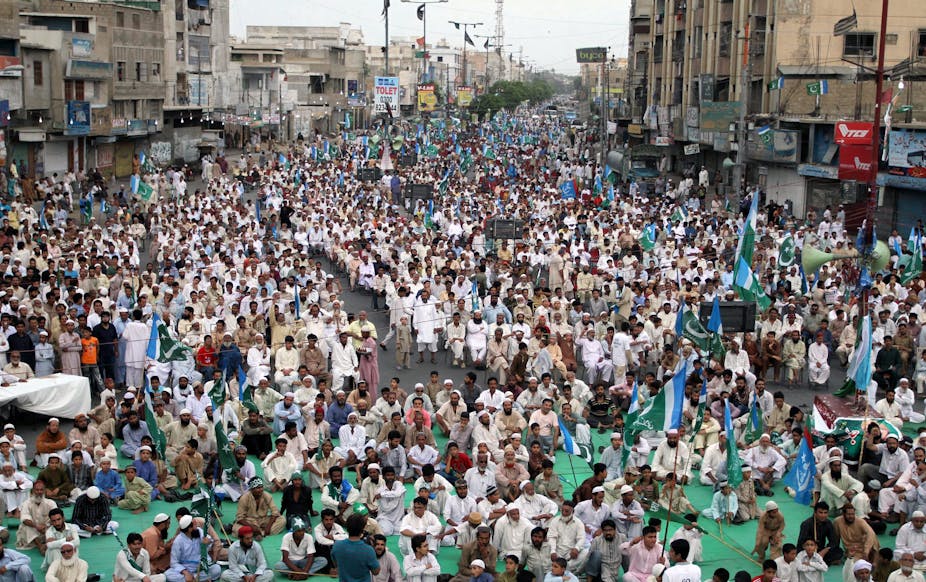For the past six weeks a high-level US team has been in Pakistan trying to negotiate a resumption of the convoys which travel through the country and provide Coalition forces in Afghanistan with about 30% of their non-lethal supplies.
Pakistan decided unilaterally to stop the convoys following the killing of 24 Pakistani soldiers at a border post by Coalition fighter planes in November last year.
One of the major sticking points in the negotiations is the fee Pakistan wants to impose on each container truck travelling through the country. Prior to the halt, Islamabad used to charge US$250 per truck; they are now asking for $3000.
The deep freeze
Washington’s decision yesterday to bring its negotiating team back from Pakistan is not a good sign. It confirms that Pakistan-US relations are indeed in a deep freeze. According to media sources, both countries were close to a resolution of the issue, but I’m not so sure about that.
Talking to many officials, academics and journalists in Pakistan in the past week, it is clear that the problem goes much deeper than the cost of each truck. It’s all about the fundamentals of the bilateral relationship and where it goes from here. The only good news in this narrative is that both countries understand that neither wants a permanent break in the relationship. That would be in no one’s interest.
Sorry seems to be the hardest word
But the bad news is that Washington is not ready to pay the price to end the deep freeze: an official, high-level apology for the death of the 24 Pakistani soldiers. And it is the lack of apology which is really upsetting the Pakistanis. It has hit a raw nerve as much among the elite as with the general public.
Pakistan cannot understand how the US can be so callous as to refuse to apologise to an ally, when President Obama happily compensated the families of the 17 Afghan civilians killed by an US soldier Robert Bales, who went on a killing rampage in March this year.
The Pakistanis have shown their deep displeasure with Washington. General Ashfaq Parvez Kayani, Chief of Army Staff and effective head of the military in Pakistan, has refused to see the head of the US negotiating team, Peter Lavoy, Deputy Assistant Secretary of Defense.
Unfortunately, if the Americans haven’t apologised after six months they are unlikely to do so now. But both sides also know that this deadlock needs to be broken sooner than later.
Drones, funds and terrorists
The growing consensus is that one way out would be a package deal which would include agreement not only on the convoys but also on US drone strikes, reimbursement from the Coalition Support Fund (CSF), and the Afghan Haqqani Network fighters hiding in North Waziristan. A few words about those three additional issues would be appropriate.
The drone attacks, of which there have been more than 300 since 2004, have become a particularly sensitive issue for Pakistan. While they have been very effective in killing high-level Al-Qaeda and Taliban terrorists, they have also killed many innocent civilians, reportedly about 20% of total deaths.
Pakistan wants an immediate end to these which it sees as a direct attack on its sovereignty. At a minimum, it wants a greater say as to who is targeted, when and where. But the US has recently unilaterally cranked up the number of drone strikes.
Pakistani officials also want the US to release $1.34 billion from the CSF for its contribution in the war. But Washington will only release these funds once the US Secretary of Defense can certify that the convoys are rolling again.
Turning to the Haqqani Network, whose fighters have reportedly inflicted the greatest damage to the Coalition forces, the Americans have been demanding repeatedly that Pakistan forces go into North Waziristan and hunt them down.
With 150,000 troops already in the tribal areas and the loss of some 4000 soldiers (more than all the Coalition forces’ fatalities in Afghanistan), there is little appetite in Pakistan to send in several more thousands soldiers into North Waziristan. However, speaking to highly-placed military officials, the mood seems to be changing on that front. Still, if the Pakistan army does go in, it will be on its terms and the timing of its choosing.
Getting the trucks rolling
So, all in all, while a package approach might be workable at officials’ level, it might be too difficult for President Zardari to sell to the general public. The wrapping might be pretty but the content of the package has to be acceptable to all stakeholders, including the military.
But the longer this freeze continues, the more difficult it becomes for the two parties to come to an agreement acceptable to all.
It certainly is in Washington’s interest to try to get the relationship back on track because it wants Pakistan to be involved constructively in the eventual talks with the Taliban in the lead up to the Coalition’s exit from Afghanistan in 2014. As for Pakistan, officials are increasingly feeling that they may have made their point with the blocking of the convoys and that it’s time to move on.
But pro-West President Zardari needs to be given something concrete before he can let those trucks roll again.
An apology from President Obama may well do the trick.

